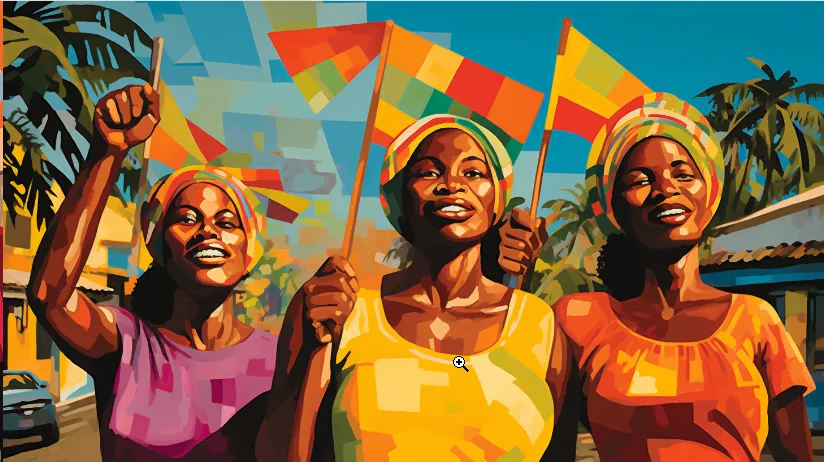Hey there, beautiful soul! Ever found yourself wondering about the unsung heroes of history? Well, today, we’re taking a trip down memory lane to Haiti, a land of resilience and revolution.
From Jean-Jacques Dessalines to the Haitian flag sewn in 1804, Haiti’s history is as vibrant as the streets of Port-au-Prince. But hold on; we’re not just talking about the men here.
Nope, we’re diving deep into the lives of Haitian women, the backbone of Haitian society. So buckle up, because this is going to be a ride through the past, present, and future of women in Haiti.
Contextualizing Haitian Women: The Pre-Revolutionary Era
Way back when, before Haiti was Haiti, it was the French colony of Saint-Domingue. And let me tell you, it was not a fun place to be a woman, especially a black woman.
See, society was really rigid about women’s roles—stuck in the home, raising kids, cooking and cleaning—you know the drill. Black women had it doubly bad, facing racism on top of sexism. It was a tough hand they were dealt.
But Haitian women made the best of it. They kept their families together, taught their kids, and passed down traditions. Little did the French know that these ladies were secretly laying the foundation for the revolution to come. Without Haitian women’s strength and spirit, there may not have even been a Haiti!
Saint-Domingue: The Societal Background
Saint-Domingue was part of the French colonial empire in the 18th century. As a major hub for the slave trade and sugar production, Haiti’s economy depended on the forced labor of enslaved Haitians
The colony was organized into a strict racial hierarchy, with wealthy white landowners at the top ruling over black slaves, who made up the majority of the population. Women of all races occupied a second-class status compared to men.
Roles and responsibilities of Haitian women
For both free and enslaved Haitian women, daily life revolved around the home. Cooking, cleaning, childcare—you name it, they did it. Black women labored in the fields while also bearing responsibility for their families.
Some women became traders and vendors, selling goods at local markets. Many practiced folk medicine and traditional spirituality. Secretly, these women passed down revolutionary knowledge and built networks of resistance.
The Intersection of Race and Sex: The Predicament of Black Women
At the bottom of the social pyramid were enslaved black women. They endured profound abuse and dehumanization as both racial and gender discrimination reared their ugly heads.
Rape and sexual violence were tragically common experiences for enslaved women. Black women were punished more severely than their male counterparts. They had no legal standing or rights to protect them from exploitation. But their spirit could not be broken.
Haitian Revolution: Women at the Helm
When the revolution erupted in 1791, Haitian women stepped up as key players in the struggle for independence.
They may not have gotten top billing in the history books, but trust me, these ladies were instrumental in overthrowing slavery and giving birth to the first black republic in the Western Hemisphere.
The motto of the revolution was “liberty or death,” and Haiti’s revolutionary women took that motto to heart.
The Defining Role in the Haitian War of Independence
Haitian women’s participation was pivotal across all dimensions of the war. They gathered intelligence, stockpiled food and supplies, recruited soldiers, and tended to the wounded. Many women smuggled weapons and ammunition under their clothing.
Some actually took up arms themselves, fighting on the frontlines and commanding military units.
The most famous example is Marie-Jeanne Lamartinière, who earned the nickname “Sergeant” for her leadership of a battalion of mainly female soldiers. These courageous women laid down their lives to liberate Haiti from tyranny.

Women in Combat: Notable Figures
Several accounts tell of the wartime exploits of individual women who proved their mettle as soldiers, strategists, and leaders:
Suzanne Louverture, wife of famed general Toussaint Louverture, rode into battle wearing a French dragoon uniform and commanding her own brigade.
Cécile Fatiman, a Vodou priestess, presided over the legendary Bois Caman ceremony that launched the revolution in 1791.
Victoria Montou, a maroon fighter, infiltrated enemy camps as a spy and scout. She also commanded respect as a fierce guerrilla warrior.
These are just a few of the courageous Haitian women who risked their lives to liberate their people. Further research keeps unearthing more names and stories from this revolutionary era.

Women and Vodou: Spiritual Dimensions of the Revolution
Haitian Vodou, a religion with deep roots in West Africa, played a vital spiritual role during the revolution. Vodou priests and priestesses officiated ceremonies to embolden the revolutionaries and fortify their solidarity.
The aforementioned Bois Caman gathering, which Cécile Fatiman organized, was crucial for stoking the flames of revolt.
Vodou rituals provided strength and sustenance to Haitian women throughout the struggle for independence.
Rewinding History: Exploration of White Women’s Role
The spotlight is often on black Haitian women’s experiences before and during the revolution. But what about white women in Saint-Domingue?
Their presence has been buried, but they too were participants in the colonial saga, playing ambiguous and complex roles.
Delving into their neglected stories reveals new dimensions of Haiti’s history.
Navigating Complexity: The Role of French Women in Haitian History
French women who migrated to the colony occupied an apex of privilege but still faced gender discrimination. Often marrying into slaveholding families, they benefited from the slave system.
Some condemned its abuses, while others ignored them. Several French women became influential plantation owners in their own right, with vast holdings and hundreds of slaves.
Figures like Montou Dédée Bazile and Flon Magalie Marcelin reveal the nuances of white women’s power.

White Women in Revolt: Stories Untold
As the uprising gained ground, growing numbers of white women fled Saint-Domingue and returned to France. But others chose to take up arms to defend plantation slavery against the rebels.
One unauthorized militia of white Creole women was dubbed “the Amazons. While they ultimately fought on the wrong side of history, their activism complicates notions of white women’s passivity.
Push and Pull: White Women Between Saint-Domingue and France
The fate of French women in Saint-Domingue reflects larger transatlantic social dynamics between colony and metropole. White women navigated between places, allegiances, and identities.
Their motives for migrating, either voluntarily or involuntarily, reveal the saga of displacement caused by Haiti’s violent birthing process. Ultimately, most left Saint-Domingue for France when the colony ceased to be hospitable to their status.
Haitian History: Addressing Gender Punishments
Girl, the fight for women’s liberty did not end when Haiti became independent. Afterwards, Haitian ladies still had to contend with all sorts of legal, social, economic, and political punishments just for being women.
The glass ceiling was really low. But the fire lit during the revolution continued to burn as women pressed on for true equality.
Punishments for Haitian Women Post-Revolution
When Haiti’s founding fathers wrote the 1805 constitution, they straight up excluded women from citizenship rights like voting and holding office. How bogus is that?
Haitian women confronted major restrictions on owning property, signing contracts, and even traveling without a male guardian’s permission.
Marital laws also penalized women heavily compared to men. Talk about gratitude for all their revolutionary sacrifices!
Struggle for Equality: An Ongoing Battle
Haitian women have fought hard over the last two centuries against these unjust penalties encoded in law, politics, society, and culture. Key suffragists like Alice Garoute and Lucie Paul-Aubin organized to demand the vote.
Outspoken critics like Paulette Poujol-Oriol have called out gender discrimination. Lawyers and activists are still working today to advance women’s status and human rights. The struggle continues, but Haiti’s women remain as determined as ever to overcome.

Making Strides: Women in Modern Haitian Society
Despite all the obstacles, Haiti’s women have made serious headway over the past decades in education, politics, business, and beyond. By leaning on their sisters and asserting their voices, Haitian ladies are still out here making big moves. The future is looking bright!
Women in Haitian Politics: The Fight for Representation
It took until 1950 for Haitian women to win the right to vote and stand for election. But they made up for lost time right away. In 1990, Ertha Pascal-Trouillot became Haiti’s first female president.
Education Empowers: Raising Haitian Women’s Literacy Rates
Lack of access to education has hindered Haitian women for generations. But major improvements are happening nowadays. While female literacy was under 50% in the 1980s, it has risen to around 64% according to recent government estimates.
For girls aged 15–24, literacy is up to around 89%. More women are also accessing higher education, though significant gender gaps remain at the university level. Equipping young women and girls with education will be key to expanding opportunities.
Against the Odds: Haitian Women Embracing Entrepreneurship
Across Haiti, women are pursuing entrepreneurship to support themselves and their families. Selling goods at the market is a longtime survival strategy that many are expanding into larger enterprises today.
Despite major hurdles like a lack of investment and discriminatory norms, Haitian women are increasingly starting small businesses in areas like clothing, prepared foods, and beauty services. Their economic leadership is indispensable for Haiti’s development.

Whew! What a journey, right? From the days of Dessalines and the Haitian Revolution to the modern struggles against human rights violations, Haitian women have been the cornerstone of resilience.
Whether it’s Marie-Jeanne Lamartiniére in the army during the Haitian Revolution or Magalie Marcelin, a suffragist and women’s rights advocate, these women have been the unsung heroes, the backbone of Haitian society.
And let’s not forget, the fight for equality is far from over. Whether it’s in the bustling streets of Port-au-Prince or the rural areas, women continue to play important roles in the Haitian government and society.
They are the mothers, the leaders, the warriors, and the spiritual guides. They are the past, present, and future of Haiti.
So, the next time you think of Haiti, remember the women who have shaped it. Because, my friend, history isn’t just his story; it’s her story too.



